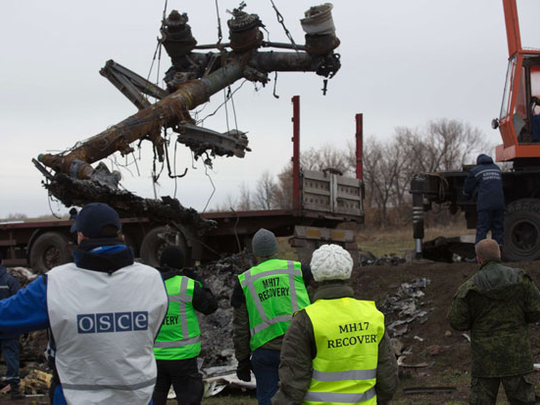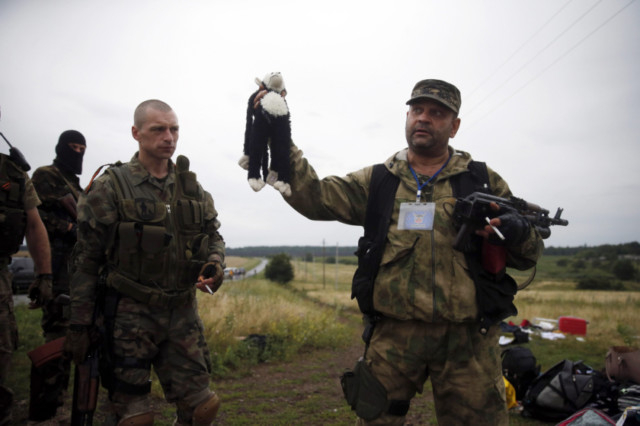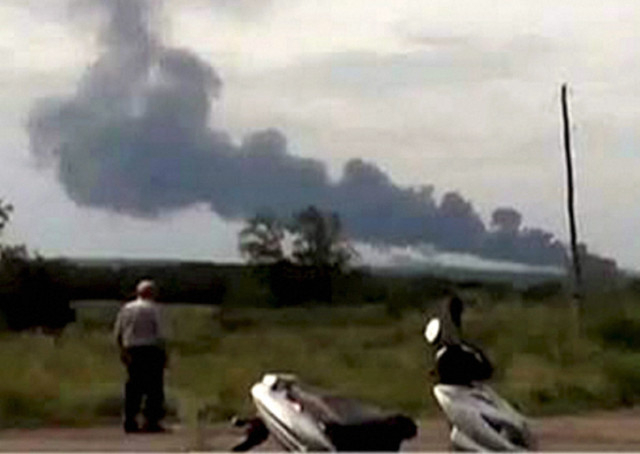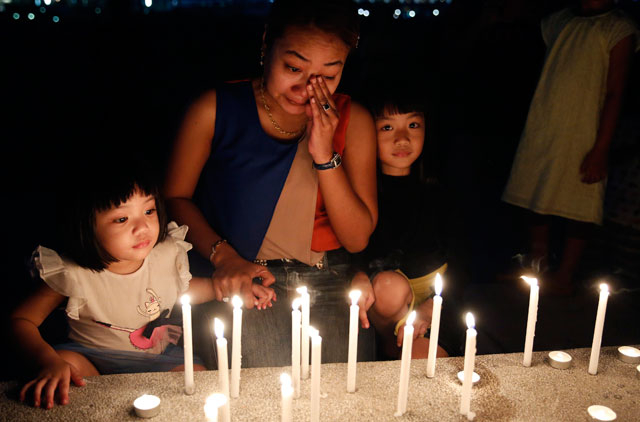
Kiev, Moscow: Russia’s Investigative Committee has confirmed the claims by a Ukrainian, who said he witnessed the deployment of a Ukrainian warplane armed with air-to-air missiles on the day the Malaysian Airlines flight MH17 was shot down.
According to reports, Russia’s Investigative Committee has confirmed the eyewitness account of a Ukrainian warplane being deployed on the day of MH17's subsequent downing.
Western governments blame rebels in eastern Ukraine for shooting down MH17 with surface-to-air missile provided by Russia.
But the incident left many unanswered questions. Certain observers highlighted the fact that Western media outlets failed to explain how a commercial airliner would be travelling though a well-known war zone within Ukrainian air space, an area that became host to a number of downed military craft during that period of time.
The Kiev ATC moved the plane approximately 200 miles north prior to the plane’s catastrophic end, noted a 21WIRE report.
“Robert Mark, a commercial pilot and editor of Aviation International News Safety magazine, confirmed that most Malaysia Airlines flights from Amsterdam to Kuala Lumpur would normally travel along a route significantly further south than the route MH17 was diverted onto.”
Investigators have explained that the anonymous Ukrainian witness was able to identify the pilot and that the plane was armed with air to air missiles:
“According to his account, he personally saw the plane piloted by [Ukrainian military pilot] Voloshin armed with R-60 air-to-air missiles,” Markin said. “He added there was no need for such weapons during regular air missions of the Ukrainian Air Forces because the rebel forces had no military aircraft.”
Immediately following the incident, independent investigators noted that ATC audio records of the MH17 flight had been confiscated by the Kiev government. Those in Washington chose not to acknowledge this crucial detail at the time.
During that time, Russian President Vladimir Putin condemned the plane attack when it was first announced, calling for a ceasefire between what Washington refers to as ‘pro-Russian separatist’ rebels and Kiev’s Western-backed Ukrainian armed forces in the wake of MH17′s downing.
It was the third such ceasefire proposal which certain observers claim Washington worked hard to undermine, preferring to politically and financially fuel the Ukrainian civil war from the outside.
Although there was much media propaganda about who held MH17′s black box, the box was handed to Dutch and the British authorities after the Malaysian authorities had acquired it in the aftermath of the crash.
New Information
The camp backing this anonymous witness account cite the lack of "transparency" about MH17′s communication with Kiev ATC prior to the plane’s being shot down.
The recent unearthing of new "information" on MH17 comes on the heels of former French airline CEO Marc Dugain claiming that the United States may have "stopped" (shot down) missing airliner MH370, as it traveled through airspace near Diego Garcia.
Ukraine truce hangs in balance after 'difficult' talks
Meanwhile, the latest push for peace in Ukraine appeared moribund on Thursday after initial talks failed to agree when the warring sides should meet again to try ending their eight-month conflict.
Negotiations mediated by European and Russian envoys in the Belarussian capital Minsk broke up after more than five hours on Wednesday with the pro-Russian rebels reporting little to no progress.
That scuppered a plan for both sides to gather again on Friday in order to sign a comprehensive agreement reinforcing a September 5 truce deal that was followed by 1,300 more deaths.
The chief negotiator for eastern Ukraine's self-declared Donetsk People's Republic said he could not disclose the "difficult" talks' details because all sides preferred to keep their differences private.
But he stressed there was no guarantee that the contacts would resume any time soon.
"We had a difficult preliminary meeting," Denis Pushilin told a pro-rebel news website.
"The date and time of the next meeting is still up in the air. It is under discussion," Pushilin said.The Belarussian foreign ministry added that "the date of the next meeting will be announced later".
Neither Ukrainian officials nor the Russian and European envoys spoke to reporters waiting outside the gated Belarussian state mansion that hosted the negotiations.
Contrasting visions
Sharply contrasting visions of Ukraine's place in Europe and its system of government have been persistently blocking a solution to the protracted war.
The two Russian-border provinces of Lugansk and Donetsk rose up against the historic shift toward Europe that Kiev made in the wake of February's ouster of an unpopular Moscow-backed president.
The separatist commanders have since declared their own republics and will settle for no less than Ukraine becoming a loose federation in which they manage most of their own affairs.
This option is backed firmly by Russia but rejected by Ukrainian nationalists who make up an important part of President Petro Poroshenko's government. Ukraine has remained tightly centralised since independence and is only now considering easing its hold over the country's regions in order to stem public resentment over the relative prosperity enjoyed in Kiev.
Such problems undermined two deals reached in Minsk in September that Poroshenko was forced into after the rebels mounted a surprisingly effective counteroffensive. NATO believes the rebel campaign was backed by crack Russian forces and tanks, which were also seen by journalists on the ground.
Russian President Vladimir Putin denies the soldiers from his army who have crossed into Ukraine are there under orders, instead describing them as "volunteers" who are "answering the call of the heart".
The overall toll in the Ukraine conflict - Europe's bloodiest since the Balkan wars of the 1990s - is more than 4,700. The war has caused friction between many of the country's Ukrainian and Russian speakers that may take generations to heal.
Money at stake
The biggest immediate issue for the rebels is to make sure that Kiev resumes social welfare payments it suspended last month out of fear that they were being used to fund the revolt.
Russia's Kiev ambassador Mikhail Zurabov - Moscow's envoy at the talks who defends the insurgents' stance - said "economic" problems had been one of the four main points on the agenda.
But a Kiev-based OSCE negotiator said the sides intended to steer clear of the payments issue. The OSCE's Heidi Tagliavini added that details of a mutual troop withdrawal and a prisoner swap were to be debated.
Ukraine looks to NATO
Adding to the tensions was the Ukrainian parliament's decision this week to officially drop the neutrality the country adopted under Russian pressure in 2010.
The ceremonial shift in Kiev's diplomatic allegiance was in line with Poroshenko's vow to put Ukraine under Western military protection in the face of Russian threats.
Ukraine sought NATO membership in the early post-Soviet era but was never viewed as a serious candidate.
The February change of regime in Kiev upset Putin's plans to get Ukraine to join a new bloc that Moscow hopes will counterbalance NATO and the European Union.
Moscow had also set Kiev's exclusion from all military unions as a condition for any Minsk deal.
Russia's defence ministry warned on Wednesday that Moscow would break off all contacts with NATO should Ukraine ever become part of the Cold War-era bloc.















